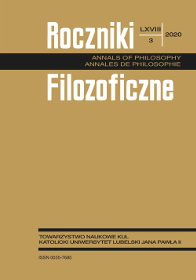Chance or Agency? A Response to “Divine Providence and Chance in the World”
Abstrakt
Przypadek czy sprawczość? Odpowiedź na „Divine Providence and Chance in the World”
Dariusz Łukasiewicz wyróżnia sześć pojęć przypadku, spośród których jedne (C3, C5, C6) są spójne z ludzką wolnością rozumianą po libertariańsku, a inne nie (C1, C2, C4). W tym eseju argumentuję na dwa sposoby, że teiści powinni odrzucić przypadek ontologiczny (C1) i odwołać się zamiast tego do nieredukowalnej sprawczości w odniesieniu do zdarzeń, które nie są opatrznościowo wyznaczone przez Boga. Moje argumenty zależą od jednoznacznego rozumienia twierdzeń, że Bóg jest kochającym sprawcą oraz że istoty ludzkie, w swoim najlepszym zachowaniu, są kochającymi sprawcami. Łukasiewicz zakłada milcząco, że takie twierdzenia cechuje niewłaściwy antropomorfizm. Opowiadam się za antropocentryzmem i będę bronić jednoznaczności.
Bibliografia
Ahern, M. B. 1963. “An Approach to the Problem of Evil.” Sophia 2: 18–26.
Albert, David, and Barry Loewer. 1988. “Interpreting the Many-Worlds Interpretation.” Synthese 77: 195–213.
Ashworth, E. Jennifer. 2017. “Medieval Theories of Analogy.” In The Stanford Encyclopedia of Philosophy (Fall 2017), edited by Edward N. Zalta. https://plato.stanford.edu/archives/fall2017/entries/analogy-medieval.
Bishop, John, and Ken Perszyk. 2016. “Concepts of God and Problems of Evil.” In Alternative Concepts of God: Essays on the Metaphysics of the Divine, edited by Andrei Buckareff and Yujin Nagasawa, 106–27. Oxford: Oxford University Press.
Forrest, Peter. 2019. Intellectual, Humanist and Religious Commitment: Acts of Assent. London: Bloomsbury.
Ghirardi, Giancarlo. 2018. “Collapse Theories.” In The Stanford Encyclopedia of Philosophy (Fall 2018), edited by Edward N. Zalta. https://plato.stanford.edu/archives/fall2018/entries/qm-collapse/.
Hills, David. 2017. “Metaphor.” In The Stanford Encyclopedia of Philosophy (Fall 2017), edited by Edward N. Zalta. https://plato.stanford.edu/archives/fall2017/entries/metaphor/.
Hobart, R. E. 1934. “Free Will as involving Determination and Inconceivable Without it.” Mind 43: 1–27.
Hume, David. 1947. Dialogues concerning Natural Religion (2nd ed.). Edited by Norman Kemp Smith. London: Nelson & Sons.
Jackson, Frank. 1982. “Epiphenomenal Qualia.” The Philosophical Quarterly 32: 127–36.
Jackson, Frank, 1986. “What Mary Didn’t Know.” The Journal of Philosophy 83: 291–5.
Kraay, Klaas J. 2010. “Theism, Possible Worlds, and the Multiverse.” Philosophical Studies 147: 355–68.
Łukasiewicz, Dariusz. 2020. “Divine Providence and Chance in the World.” Roczniki Filozoficzne 68 (3): 5–34.
Paley, William. 1802. Natural Theology, or Evidence of the Existence and Attributes of the Deity, Collected from the Appearances of Nature. London: J. Faulder.
Plantinga, Alvin. 1983. “Reason and Belief in God.” In Faith and Rationality, edited by Alvin Plantinga and Nicholas Wolterstorff, 16–93. Notre Dame, IN: University of Notre Dame Press.
Rowe, William. 2004. Can God be Free? Oxford: Oxford University Press.
Vaidman, Lev. 2018. “Many-Worlds Interpretation of Quantum Mechanics.” In The Stanford Encyclopedia of Philosophy (Fall 2018), edited by Edward N. Zalta. https://plato.stanford.edu/archives/fall2018/entries/qm-manyworlds/.
Van Inwagen, Peter. 1988. “The Place of Chance in a World Sustained by God.” In God, Knowledge, and Mystery, edited by Peter van Inwagen, 42–65. Ithaca, NY: Cornell University Press.
Wolterstorff, Nicholas. 1976. Reason within the Bounds of Religion. Grand Rapids, MI: Eerdmans.
Copyright (c) 2020 Roczniki Filozoficzne

Utwór dostępny jest na licencji Creative Commons Uznanie autorstwa – Użycie niekomercyjne – Bez utworów zależnych 4.0 Międzynarodowe.





